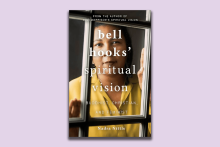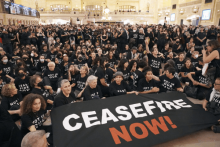Opinion

Gary’s goal in the trial was to bring the buried deeds of the Loewen Group into the light, to tell the story they hid behind contracts and laws and cultural biases and systemic injustice. In doing so, he aims to purchase some measure of justice. Is this what Willie Gary learned in Black church?

I’m older now and a good bit more skeptical about Israel’s virtue and Israel’s safety. I am far from convinced that Israel could or would serve as a refuge from violence for the American Jewish diaspora — the home of the majority of Jewish people outside Israel. And I think that viewing regions across the world in which the diaspora has settled to be temporary or lesser than ideal is dangerous to Jewish people and to the Jewish experience.

At their strongest, films and TV shows can help us pay attention to — and by extension, love — the people and the world around us.

It is the norm for Western media outlets to silence and ignore the voices of Palestinians. Israel set up a blockade against Gaza beginning in 2007 in response to Hamas’ taking over the territory. By restricting the movement of goods and people in and out of the territory, Israel has created a humanitarian crisis in Gaza. Israel has attempted to justify this blockade and the ensuing humanitarian crisis by characterizing Gazans specifically, and Palestinians in general, as “terrorists” — a characterization of Palestinians that is also prevalent in the United States.

My seminary students are eager to confront the challenge Christian nationalism poses, including its simplistic use and cynical abuse of biblical texts. Christian nationalists wield the Bible as if it were a static authority, perverting its vision of peoplehood to emphasize homogeneity. Yet the biblical writings themselves are characterized by lively exchanges, competing perspectives across multiple generations, and appeals to care for the stranger.

Nearly two years have passed since feminist bell hooks died of renal failure on December 15, 2021. The writer of more than three dozen books was widely remembered for her contributions to feminism, cultural criticism and scholarship — not to mention her decision to lowercase her pen name, chosen in honor of her great-grandmother, Bell Blair Hooks.

In Priscilla, which is based off Priscilla Presley’s 1985 memoir Elvis and Me, we don’t primarily see Elvis through the eyes of his manager or adoring fans, instead, we see him through the eyes of the only woman he ever married, who he began courting when he was 24 and she was 14.

Like many across the world, the events in Israel and Palestine have had me glued to a wide variety of sources in search of live updates. My first reaction was to message my dear friends living in Israel-Palestine to check on them and their families’ safety: Sami, Mohammad, Jehad, Feras, Jack, Miriam, and Naama. My heart is tremendously heavy with the immense loss of precious life that has already unfolded and the dread for the violence still to come. I say this sorrowfully and without an ounce of callousness: This attack by Hamas, though sudden and horrific, did not come as a surprise to me.

Illinois set a historic U.S. precedent on Sept. 18, when it became the first state to abolish cash bail.
Cash bail, or the practice of imprisoning people accused of crimes before their trial unless they can pay a certain amount of money set by a judge, has a pernicious history. In the United States, cash bail has led to high rates of pretrial incarceration. Consider these statistics: There are more than 400,000 people in the United States who have been incarcerated without a trial. In Illinois, the problem has been especially sobering, with the Center for Criminal Justice of Loyola University Chicago reporting that in 2020 and 2021, 173,000 people were held in jail before a trial.

The real mystery of Killers of the Flower Moon is not who murdered so many Osage people, it’s how these murders can go on for so long — how the loss of life can be dismissed with such apathy.

Wars, by their very nature, often force people to choose sides and dehumanize the other side to justify violence. We’ve seen the dangers of this binary here in the U.S. as some student groups in support of Palestinian liberation have wrongfully praised or failed to condemn Hamas’ attacks, while some pro-Israeli groups (including many U.S. Christians) have failed to acknowledge the injustice of the ongoing occupation of Palestine and the severe death toll Israel’s response has inflicted on Gazan civilians. Yet while the powers of the world want us to take a side and declare ourselves fully (and exclusively) pro-Israeli or pro-Palestinian, Christian compassion must be freed from favoritism. As peacemakers, we must honor the image of God in every Israeli and every Palestinian.

Thirty years after the release of the Steven Spielberg film that brought T. Rex to the silver screen and turned velociraptor into a global superstar, I sat in the theater watching Jurassic Park again. But this time, it wasn’t the giant dinosaurs that captivated me. It was a small, intimate conversation between Hammond and Sattler.

The nations of the world — including the U.S. — are against them. They use money, weapons, diplomacy, and theology against the people of Palestine, the people of Gaza. They talk among themselves about where we will end up after our ethnic cleansing, as if we were extra boxes that have no place in the house!

Lost in the conversation about abortion rights and religious liberty is the fact that many Christians are not merely politically in favor of abotion access, but theologically in favor as well. These attempts to restrict abortion care and reproductive rights — even to the point where it puts the lives of pregnant people at dire risk — go against our Christian faith.

I am not interested in a commercialized version of Día de Muertos; parades, concerts, and celebrations where I must buy a ticket are an invention of capitalism. I am interested in the family remembrance rituals, in the nights at the cemetery communing with loved ones, in the ofrendas set up in homes, schools, and public plazas.

It’s clear why fans created the once popular but now defunct Facebook page,“Is This Sufjan Stevens Song Gay Or Just About God?” But Stevens’ music has never been either gay or about God. It’s indivisibly gay and about God.

I have spent my life advocating for Palestinians and Israelis to use nonviolent means to resolve their conflicts. Because Israel feared Palestinian unity and mass nonviolent action, I was expelled by the government in 1988. Since then, I have, on several occasions, personally advocated with Hamas leaders to abandon armed struggle and embrace nonviolent campaigns. Yet, today, Palestinians and Israelis are once again killing each other.

As is still the case today, bipartisan programs take effort — and bringing PEPFAR to life was no small feat. It required navigating a host of controversial issues such as the use of condoms and perceptions of the disease. It required enlisting the support of social conservatives. It required making an economic, a national security, and a humanitarian argument. It required raising awareness and galvanizing political will.

Book-banning has always been about censoring the stories, histories, and information that push us to question the status quo.

With her book, and her appearance in the documentary series Shiny Happy People: Duggar Family Secrets, Jill peels back layers of life on reality TV.